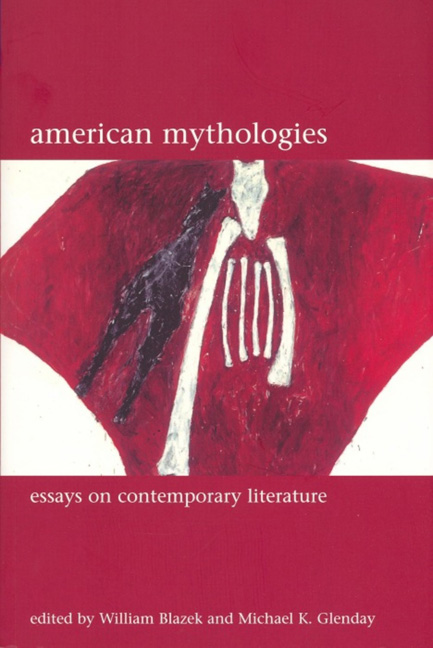Book contents
- Frontmatter
- Dedication
- Contents
- Acknowledgements
- Introduction
- 1 Indians with Voices: Revisiting Savagism and Civilization
- 2 Wild Hope: Love, Money and Mythic Identity in the Novels of Louise Erdrich
- 3 Float Like a Butterfly, Sting Like a Bee: Mythologies of Representation in Selected Writings on Boxing by Norman Mailer
- 4 The Secret Sharing: Myth and Memory in the Writing of Jayne Anne Phillips
- 5 The Individual's Ghost: Towards a New Mythology of the Postmodern
- 6 ‘Cheap, On Sale, American Dream': Contemporary Asian American Women Writers’ Responses to American Success Mythologies
- 7 ‘No Way Back Forever’: American Western Myth in Cormac McCarthy's Border Trilogy
- 8 Native American Visions of Apocalypse: Prophecy and Protest in the Fiction of Leslie Marmon Silko and Gerald Vizenor
- 9 The Brave New World of Computing in Post-war American Science Fiction
- 10 Mythologies of ‘Ecstatic immersion’: America, The Poem and the Ethics of Lyric in Jorie Graham and Lisa Jarnot
- 11 Whose Myth is it Anyway? Coyote in the Poetry of Gary Snyder and Simon J. Ortiz
- 12 Aging, Anxious and Apocalyptic: Baseball's Myths for the Millennium
- 13 Finding a Voice, Telling a Story: Constructing Communal Identity in Contemporary American Women's Writing
- Notes on Contributors
- Index
11 - Whose Myth is it Anyway? Coyote in the Poetry of Gary Snyder and Simon J. Ortiz
- Frontmatter
- Dedication
- Contents
- Acknowledgements
- Introduction
- 1 Indians with Voices: Revisiting Savagism and Civilization
- 2 Wild Hope: Love, Money and Mythic Identity in the Novels of Louise Erdrich
- 3 Float Like a Butterfly, Sting Like a Bee: Mythologies of Representation in Selected Writings on Boxing by Norman Mailer
- 4 The Secret Sharing: Myth and Memory in the Writing of Jayne Anne Phillips
- 5 The Individual's Ghost: Towards a New Mythology of the Postmodern
- 6 ‘Cheap, On Sale, American Dream': Contemporary Asian American Women Writers’ Responses to American Success Mythologies
- 7 ‘No Way Back Forever’: American Western Myth in Cormac McCarthy's Border Trilogy
- 8 Native American Visions of Apocalypse: Prophecy and Protest in the Fiction of Leslie Marmon Silko and Gerald Vizenor
- 9 The Brave New World of Computing in Post-war American Science Fiction
- 10 Mythologies of ‘Ecstatic immersion’: America, The Poem and the Ethics of Lyric in Jorie Graham and Lisa Jarnot
- 11 Whose Myth is it Anyway? Coyote in the Poetry of Gary Snyder and Simon J. Ortiz
- 12 Aging, Anxious and Apocalyptic: Baseball's Myths for the Millennium
- 13 Finding a Voice, Telling a Story: Constructing Communal Identity in Contemporary American Women's Writing
- Notes on Contributors
- Index
Summary
I sit without thoughts by the log-road
Hatching a new myth
Gary Snyder, “Hunting I”, first shaman song, Myths and Texts… Indians always tell a story. The only way to continue is to tell a story and that's what Coyote says
Simon J. Ortiz, Preface to A Good JourneyAll art is a collaboration
J. M. Synge, Preface to The Playboy of the Western WorldGary Snyder's use of Native American myths and legends has been seen as a classic case of appropriation. Geary Hobson points out that the ‘white shaman’ fad among mainstream American poets seems to have begun with Snyder and his ‘Shaman Songs’ sections of Myths and Texts (1960), while Leslie Marmon Silko has advised Snyder to look into the history of his own (white) ancestors in his search for a genuine American identity, rather than borrowing from the myths of Native peoples. This essay will evaluate the arguments made against the mainstream use of Native myth, the so-called ‘appropriation of voice’. In order to provide a focus for this complex question I shall offer a contrastive study of the use of Coyote in the poetry of Gary Snyder and Simon J. Ortiz (Acoma Pueblo).
What are the main arguments made by more radical Native spokes-persons against the importation of Native oral tales into mainstream literature? One argument put forward is that Native writers should be allowed to speak for themselves. Appropriators, it is said, in effect gain money and prestige at the expense of those for whom they would claim to speak. Another argument is that appropriation, to quote Geary Hobson, is ‘a new version of cultural imperialism’ (100). The history of post-contact America is one of dispossession of the life and rights of the Native peoples, and the theft of Native cultural materials by ethnologists and ethnopoets is considered imperialism in another guise. It is also argued that appropriators are frequently insensitive to the significance of the spoken word in Native cultures. Native myths and legends pass down cultural values which defined the identity of the people.
- Type
- Chapter
- Information
- American MythologiesNew Essays on Contemporary Literature, pp. 226 - 242Publisher: Liverpool University PressPrint publication year: 2005

